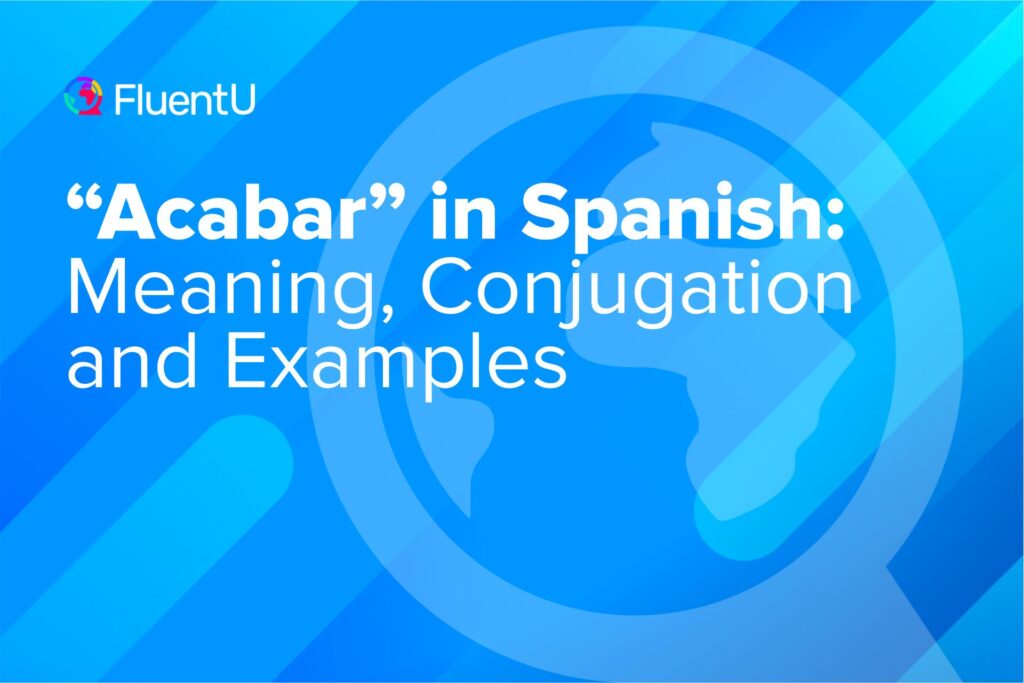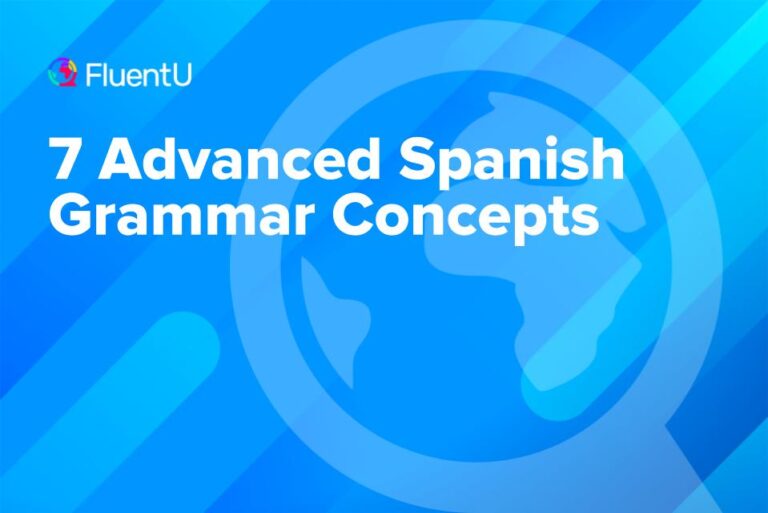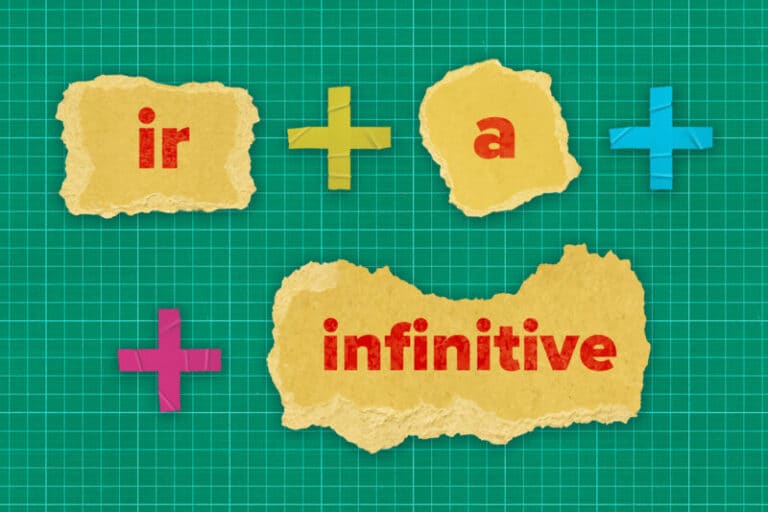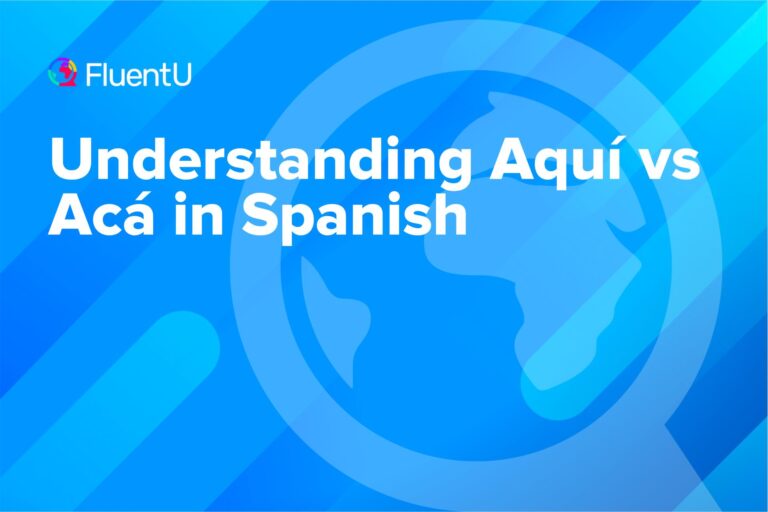“Acabar” in Spanish: Meaning, Conjugation and Examples

Acabar can be a challenging verb to learn in Spanish, but one that comes with lots of rewards. Acabar literally means “to finish” or “to end,” but it can convey a few different meanings depending on how it’s used and you’ll probably see it quite often.
With explanations of the verb’s various uses, examples and tips on practicing, this guide will help you get the hang of acabar, and have fun doing it!
Download: This blog post is available as a convenient and portable PDF that you can take anywhere. Click here to get a copy. (Download)
What Does the Verb Acabar Mean in Spanish?
Acabar directly translates to “to end” or “to finish,” but is slightly different from terminar (to end).
Acabar is most commonly used to express having just done something in the recent past. Depending on the preposition used with acabar, the meaning can change.
What is the Difference Between Acabar and Terminar?
While both acabar and terminar generally mean “to finish” or “to end,” they can be used in slightly different contexts.
Acabar often implies the completion of an action or task, while terminar can be used more broadly and may also give the idea of concluding a process or ending up at a final state. In practical terms, they are often interchangeable, but which one you choose depends on the nuance you want to convey.
Keep reading to learn more about four of the main uses of the verb acabar in Spanish.
Main Uses of Acabar in Spanish
Here are the four different ways to use this verb and how the meaning changes with the way it’s formed.
1. Acabarse (“To use up” or “To run its course”)
As a reflexive verb, acabarse means “to use up,” “to run its course” or “to die.”
When a verb is reflexive, it means that the action of the verb remains with the subject. For example, if a concert ends or your perfume runs out, the reflexive form of acabar must be used. For example:
El concierto se acabó. (The concert ended.)
On the other hand, if you finish your homework, it isn’t your homework itself that has ended, but rather you’ve finished it, so you’d use the regular form of acabar:
Yo acabé mi tarea. (I finished my homework.)
Conjugating Acabarse
In the reflexive form, the verb is conjugated the same, only an object pronoun is replaced before the conjugated form of the verb or after the infinitive.
Below is a conjugation chart for acabarse in the preterite form (its most common use):
| Subject | Reflexive Pronoun | Conjugation |
|---|---|---|
| Yo | Me | Acabé |
| Tú | Te | Acabaste |
| Él/Ella/Usted | Se | Acabó |
| Nosotros | Nos | Acabamos |
| Vosotros | Os | Acabasteis |
| Ellos/Ellas/Ustedes | Se | Acabaron |
Here are some examples of the use of acabarse:
Los boletos se acabaron hace una semana. (The tickets sold out a week ago.)
Él se acabó cuatro días antes de su cumpleaños. (He died four days before his birthday.)
La película se acabó cuando la pareja se reunió. (The movie ended when the couple reunited.)
2. Acabar de + Infinitive (“To have just finished”)
Acabar de + infinitive is used to describe something that just happened in the recent past.
The English equivalent of acabar de + infinitivo would be “to have just finished doing something.”
To use acabar effectively in this situation, the preposition de must be used. In English, the past participle of the verb is used, but in Spanish an infinitive is used instead.
The present tense of acabar de + infinitivo is used for describing something that just happened in the immediate past.
These events are so recent, that they almost happened in the present tense.
To speak of things that happened further in the past (the past perfect tense in English), the imperfect past tense is used in Spanish.
Conjugating Acabar de + Infinitive
Conjugating acabar de in the most recent past requires the present tense of the verb. This table shows this conjugation using comer as the infinitive to say “just ate”:
| Subject | Conjugation |
|---|---|
| Yo | Acabo de comer |
| Tú | Acabas de comer |
| Él/Ella/Usted | Acaba de comer |
| Nosotros | Acabamos decomer |
| Vosotros | Acabais de comer |
| Ellos/Ellas/Ustedes | Acaban de comer |
Conjugating acabar de in the more distant past requires the imperfect past tense of the verb. This table demonstrates this form, so as to say “had just ate:”
| Subject | Conjugation |
|---|---|
| Yo | Acababa de comer |
| Tú | Acababas de comer |
| Él/Ella/Usted | Acababa de comer |
| Nosotros | Acabábamos de comer |
| Vosotros | Acababais de comer |
| Ellos/Ellas/Ustedes | Acababan de comer |
Here are some examples of how it can be used in the present and imperfect past tenses.
Present:
Yo acabo de escribir. (I just finished writing.)
Ella acaba de comer. (She just finished eating.)
Past:
Tú acababas de leer. (You had just finished reading.)
Ellos acababan de jugar. (They had just finished playing.)
3. Acabar por + Infinitive (“Finally did” or “ended up doing”)
When using acabar with the preposition por, the meaning changes slightly.
Acabar por + infinitivo is used to express finally doing something or ending up doing something that perhaps wasn’t initially expected.
Because it refers to something that happened in the past, the preterite tense is used.
Conjugating Acabar por + Infinitive
In the case of acabar por, the preterite tense is always used, as shown below to say “finally ate”
| Subject | Conjugation |
|---|---|
| Yo | Acabé por comer |
| Tú | Acabaste por comer |
| Él/Ella/Usted | Acabó por comer |
| Nosotros | Acabamos por comer |
| Vosotros | Acabasteis por comer |
| Ellos/Ellas/Ustedes | Acabaron por comer |
Below are some examples of how to use acabar por + infinitivo in the context of ending up doing something and doing something:
To finally do something:
Yo acabé por llegar a mi casa. (I finally arrived at home.)
Usted acabó por bailar conmigo. (You finally danced with me.)
To end up doing something:
Nosotros acabamos por ir en tren. (We ended up taking the train.)
Ellos acabaron por comer pollo en lugar de res. (They ended up eating chicken instead of beef.)
4. Acabar con algo (“To have ended something” or “to have ruined something”)
Acabar con algo means “to have ended,” “to have ruined” or “to have destroyed” someone or something.
While the preposition con literally translates to “with,” in this case it simply translates to “to have ended something.”
This form of acabar is also used in the preterite tense.
Conjugating Acabar con (algo)
In the case of acabar con, the preterite tense is most often used, as shown below:
| Subject | Conjugation |
|---|---|
| Yo | Acabé con |
| Tú | Acabaste con |
| Él/Ella/Usted | Acabó con |
| Nosotros | Acabamos con |
| Vosotros | Acabasteis con |
| Ellos/Ellas/Ustedes | Acabaron con |
Listed here are some examples of how to use acabar con to describe having just ended, ruined or destroyed a person, place or thing:
Ese tiro acabó con el juego. (That shot ended the game.)
Tú acabaste con nuestro matrimonio. (You destroyed our marriage.)
La lluvia acabó con nuestro picnic. (The rain ruined our picnic.)
Quick Tips for Fully Learning Acabar
- Create Flashcards. Try writing out different conjugated forms of acabar on one side of the card and the English translation on the back. The more you practice, the faster you’ll learn how to differentiate between the various uses of acabar. In no time, you’ll be able to use acabar de, acabar con and acabar por like a native speaker.
- Write Letters. Consider writing a letter to a friend or language partner, telling a story about something you’ve done recently. This is a great way to practice the use of acabar. If you mention anything that you’ve just completed, expect to use this verb in your letter.
- Watch the News. To share recent news in Spanish, it’s likely that the anchor will need to use the verb acabar at some point. That’s why, if you want to listen to acabar being used in a natural setting, watching the news is a great choice.
- Read a Newspaper. Try reading a newspaper in Spanish and highlighting every time you see the verb acabar. Not only will you learn about what’s going on in the world, but you’ll improve your Spanish grammar in the meantime.
- Learn with Authentic Videos. The Internet is huge, and it has a lot of great content in Spanish. Look for music videos, comedy skits, vlogger channels or anything else that piques your interest. Videos made by and for native speakers will let you hear lots of common verbs in action, including acabar. For a more focused approach, you could also use a virtual immersion platform such as FluentU.
FluentU takes authentic videos—like music videos, movie trailers, news and inspiring talks—and turns them into personalized language learning lessons.
You can try FluentU for free for 2 weeks. Check out the website or download the iOS app or Android app.
P.S. Click here to take advantage of our current sale! (Expires at the end of this month)

Hopefully you have a better understanding of how to use acabar now, as well as some resources where you can learn more.
Study the conjugations and try to use the verb naturally as much as possible. You’re already on your way!
Download: This blog post is available as a convenient and portable PDF that you can take anywhere. Click here to get a copy. (Download)
And One More Thing…
If you've made it this far that means you probably enjoy learning Spanish with engaging material and will then love FluentU.
Other sites use scripted content. FluentU uses a natural approach that helps you ease into the Spanish language and culture over time. You’ll learn Spanish as it’s actually spoken by real people.
FluentU has a wide variety of videos, as you can see here:

FluentU brings native videos within reach with interactive transcripts. You can tap on any word to look it up instantly. Every definition has examples that have been written to help you understand how the word is used. If you see an interesting word you don’t know, you can add it to a vocab list.

Review a complete interactive transcript under the Dialogue tab, and find words and phrases listed under Vocab.

Learn all the vocabulary in any video with FluentU’s robust learning engine. Swipe left or right to see more examples of the word you’re on.

The best part is that FluentU keeps track of the vocabulary that you’re learning, and gives you extra practice with difficult words. It'll even remind you when it’s time to review what you’ve learned. Every learner has a truly personalized experience, even if they’re learning with the same video.
Start using the FluentU website on your computer or tablet or, better yet, download the FluentU app from the iTunes or Google Play store. Click here to take advantage of our current sale! (Expires at the end of this month.)







